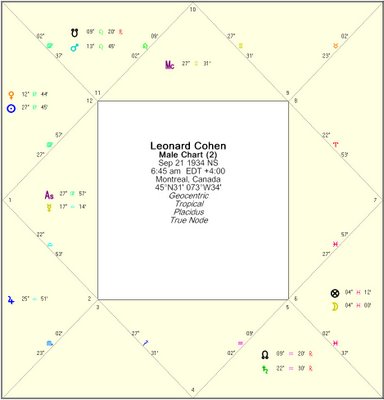Waiting for the Miracle - Leonard Cohen

- St. Francis: The Miracle of the Spring
Baby, I've been waiting,
I've been waiting night and day.
I didn't see the time,
I waited half my life away.
There were lots of invitations
and I know you sent me some,
but I was waiting
for the miracle, for the miracle to come.
From "Waiting for the Miracle" by Leonard Cohen
The singer/songwriter/poet Leonard Cohen hardly needs an introduction; his carefully crafted lyricism has inspired countless musicians from Suzanne Vega to U2. I recently saw the documentary Leonard Cohen: I'm Your Man and became curious about Cohen's horoscope and what it showed about his unique artistic style. For those unfamiliar with Cohen's writing, he is at once deeply melancholy and humorous, a romantic on an endless quest for redemption and rare Grace.
Even before I had seen the documentary, it was clear to me that Cohen was a melancholic, though obviously with a twist, since melancholics are not in themselves given to pouring out their experiences to the world. He struggled for many years with depression (perhaps not unlike Lilly's "hypochondriac melancholy") and has come out the better for it, his innate lyrical ability burnished by the friction between the attraction of the material on the one hand and a striving for salvation on the other. Several years in a Zen monastery on California's Mount Baldy seems to have refined Cohen's perspective without necessarily dulling his acute power of observation. His birth chart is below:

Note that the birth time is approximate, and thus may actually give an early Libra Ascendant. Regardless of this, however, the conclusions I reach would be largely similar. Neurosurgery this is not.
The Lord of the Geniture here is Saturn retrograde in its own sign in the 5th house of creative works. Cohen is said to spend a year on each song, refining it through numerous drafts to create a polished gem. This is a Saturnian process indeed, with the endless revisions expected from a retrograde planet. And yet, Saturn in the 5th house will leave its stamp on the native's creations (be they children, poems or songs) – Cohen is not known for chipper musical fare. And yet, the whole thing is saved by a trine from Jupiter near Spica in the 2nd house. In its higher sense, the 2nd house shows the self-worth of the native. Jupiter on Spica, a religiously orientated, benefic fixed star will give an eternal belief that redemption is possible. This constant religious yearning is present in seemingly every song and poem, whether overtly spiritual or not.
Finally, then, we come to Cohen's art. First house Mercury rules the chart, and we immediately notice its mutual reception with the very weak Venus in the 12th house. This connection immediately makes one think of artistic skill, and yet, with the difficult Venus, the artistic process cannot be easy nor joyful so much as an urgent necessity. Mercury and Venus further dominate the chart by reception; five planets are in the dignities of one of the planets. Notably, Saturn, the Lord of the Geniture is not one of those five. This may signify that ultimately, he will do his best work when he approaches his creativity as a discipline, rather than merely a means to create art (Venus) or express himself (Mercury). I believe that Cohen has been largely successful in this - ultimately, he says, he is a vehicle through which art and Grace flow as They will, when they will. His goal is simply to be prepared when They arrive.
Baby, I've been waiting,
I've been waiting night and day.
I didn't see the time,
I waited half my life away.
There were lots of invitations
and I know you sent me some,
but I was waiting
for the miracle, for the miracle to come.
From "Waiting for the Miracle" by Leonard Cohen
The singer/songwriter/poet Leonard Cohen hardly needs an introduction; his carefully crafted lyricism has inspired countless musicians from Suzanne Vega to U2. I recently saw the documentary Leonard Cohen: I'm Your Man and became curious about Cohen's horoscope and what it showed about his unique artistic style. For those unfamiliar with Cohen's writing, he is at once deeply melancholy and humorous, a romantic on an endless quest for redemption and rare Grace.
Even before I had seen the documentary, it was clear to me that Cohen was a melancholic, though obviously with a twist, since melancholics are not in themselves given to pouring out their experiences to the world. He struggled for many years with depression (perhaps not unlike Lilly's "hypochondriac melancholy") and has come out the better for it, his innate lyrical ability burnished by the friction between the attraction of the material on the one hand and a striving for salvation on the other. Several years in a Zen monastery on California's Mount Baldy seems to have refined Cohen's perspective without necessarily dulling his acute power of observation. His birth chart is below:

Note that the birth time is approximate, and thus may actually give an early Libra Ascendant. Regardless of this, however, the conclusions I reach would be largely similar. Neurosurgery this is not.
The Lord of the Geniture here is Saturn retrograde in its own sign in the 5th house of creative works. Cohen is said to spend a year on each song, refining it through numerous drafts to create a polished gem. This is a Saturnian process indeed, with the endless revisions expected from a retrograde planet. And yet, Saturn in the 5th house will leave its stamp on the native's creations (be they children, poems or songs) – Cohen is not known for chipper musical fare. And yet, the whole thing is saved by a trine from Jupiter near Spica in the 2nd house. In its higher sense, the 2nd house shows the self-worth of the native. Jupiter on Spica, a religiously orientated, benefic fixed star will give an eternal belief that redemption is possible. This constant religious yearning is present in seemingly every song and poem, whether overtly spiritual or not.
Let us move on to the overall temperament; using Lilly's method, the constitution is strongly melancholic and overwhelmingly dry. Along with the usual traits of melancholics, Cohen has quite a dry sense of humor (he said of his first stay at the Zen monastery that he left because it was run by a Japanese Roshi, with a German head monk and with all the Americans walking around in sandals, it seemed to him too much like revenge for World War II). Along with Jupiter, an important source of life-giving moisture here is the Moon in Pisces on Fomalhaut, a royal fixed star that gives treasures in the next world. Cohen spent many years working hard to renounce material success and acclaim; perhaps only his stay in an austere monastery, serving as a cook and driver to the Roshi (6th house of servitude) allowed him to satisfy that longing. The long sabbatical seems to have refreshed Cohen's spirits and creativity in a way his previous efforts did not. The proximity of the Part of Fortune further underscores the importance of renunciation and service in his very core of the being.
Finally, then, we come to Cohen's art. First house Mercury rules the chart, and we immediately notice its mutual reception with the very weak Venus in the 12th house. This connection immediately makes one think of artistic skill, and yet, with the difficult Venus, the artistic process cannot be easy nor joyful so much as an urgent necessity. Mercury and Venus further dominate the chart by reception; five planets are in the dignities of one of the planets. Notably, Saturn, the Lord of the Geniture is not one of those five. This may signify that ultimately, he will do his best work when he approaches his creativity as a discipline, rather than merely a means to create art (Venus) or express himself (Mercury). I believe that Cohen has been largely successful in this - ultimately, he says, he is a vehicle through which art and Grace flow as They will, when they will. His goal is simply to be prepared when They arrive.
"There is a crack in everything;
That's how the light gets in."
- Leonard Cohen


2 Comments:
Nice piece on the great Master of Melancholy! I wanted to comment on the following well-phrased sentence:
"First house Mercury rules the chart, and we immediately notice its mutual reception with the very weak Venus in the 12th house. This connection immediately makes one think of artistic skill, and yet, with the difficult Venus, the artistic process cannot be easy nor joyful so much as an urgent necessity."
This is further highlighted by his musings in Tower of Song:
"I was born like this, I had no choice
I was born with the gift of a golden voice
And twenty-seven angels from the great beyond
They tied me to this table right here
In the tower of song"
So yes, it's hard work for him and a necessity. Nevertheless, the result shows the influence of "twenty-seven angels from the great beyond"! :)
Dear Peter,
Thank you; I'm glad you liked it. You know, even when he is most serious, he is very self-deprecating; "I was born with the gift of a golden voice." I think that self-deprecation is almost a signature of a melancholic combined with a dash of Mercury, as here.
My best,
Nina
Post a Comment
<< Home